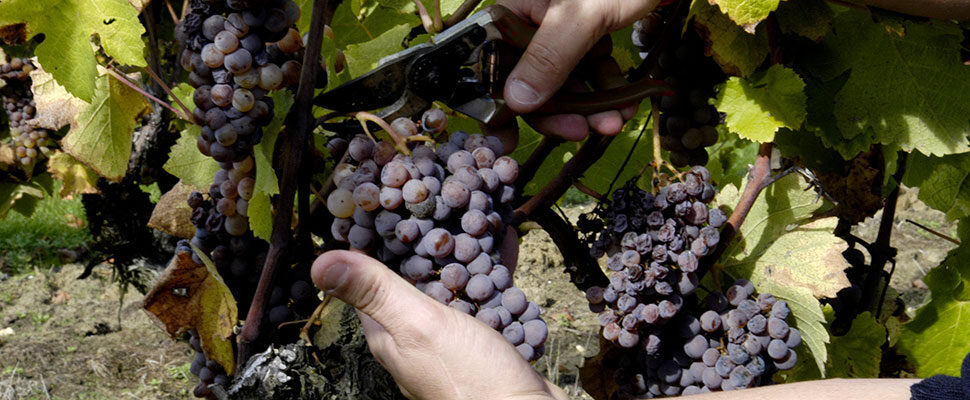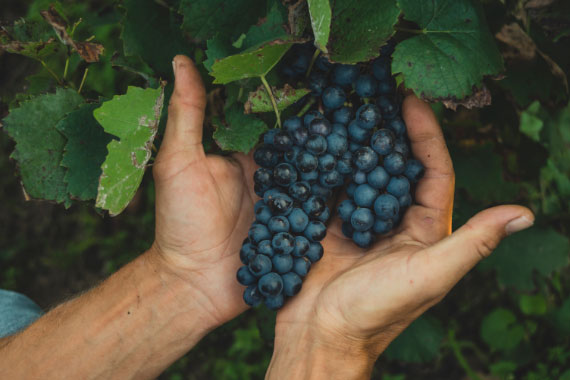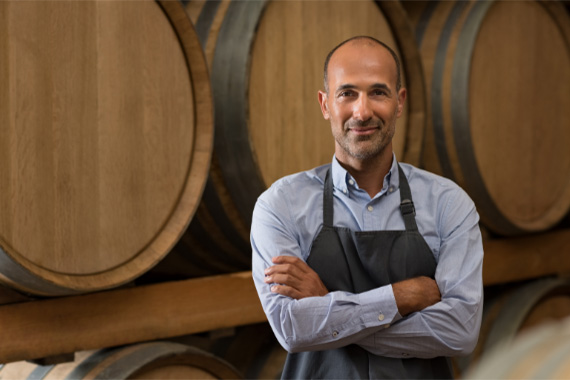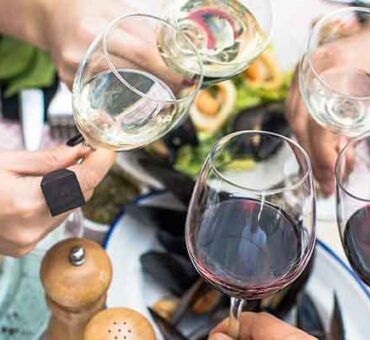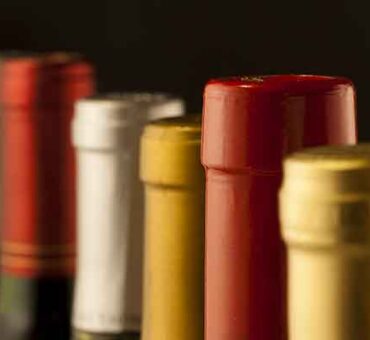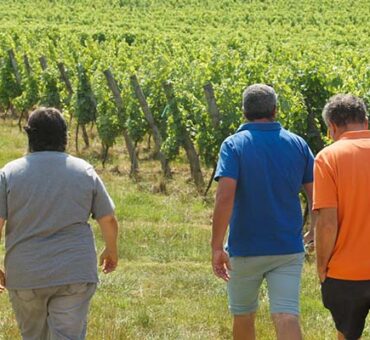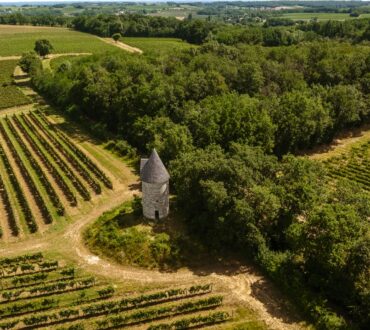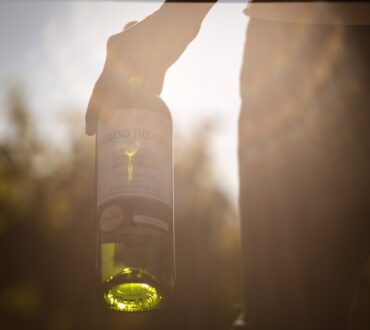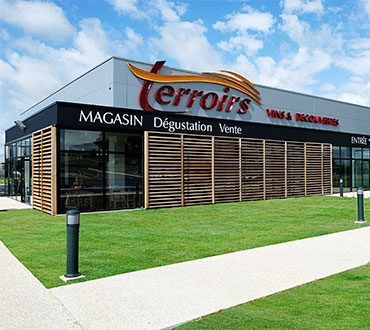1. The production stages
Wine making is a practice that is over a thousand years old. Over the years, techniques have been refined and have become more modern. Science has joined this art! Indeed, the elaboration of a wine is a natural process which requires a human intervention helped by technological tools. Five steps are necessary to make wine. Let’s discover them now!
- Step 1: the harvest
This first step in the wine making process is essential to guarantee the excellence of the wine! Harvesting is done according to the maturity (the balance between sugar and acidity) and the style that the winemakers wish to give to their wines.
The best time to harvest the grapes is also defined by a little help from science but also by tasting the grapes, the oldest method!
Finally, the weather also plays an important role in the choice of the harvest time.
Concerning the techniques, the harvest can be done in two ways: by hand or mechanically, although for Univitis almost all the harvest is done mechanically.
At Univitis, our viticultural teams carry out a meticulous selection of grapes, which are sorted and placed in different vats according to the desired style of wine.

- Step 2: Reception of the grapes
After the selection and reception of the grapes in the cellar, the grapes for the white/pink wines and the red wines follow two different processes.
This step has been done for centuries with the help of… feet! Yes, the destemming and crushing were done by trampling the grapes. Today, pneumatic presses gently extract the juice from the white and rosé grapes before they are put into fermentation tanks. For the red wine, the grapes are mechanically crushed and then put directly into the fermentation tank.
For the white wine, the pressing is done very quickly so that the skins, seeds and other residues of the grapes are separated from the juice. The objective of this technique is to prevent the juice from being colored. After pressing, the juice is clarified a first time to gain in finesse and aromatic quality.
For red wine, the grapes, skins and residues remain in contact with the juice in order to develop the aromas, colors and more pronounced tannins.
Then comes the fermentation stage.
- Stage 3: Fermentation
In this stage, the must (or grape juice) begins to ferment. At Univitis we systematically bring in yeasts that are selected for a regular and complete fermentation of the juice. This fermentation is carried out until all the sugars are transformed into alcohol. This can take from 10 days to 1 month (only for sweet wines) depending on the grapes. To create a sweet wine, the fermentation is stopped before all the sugar is transformed into alcohol.
Once the sugar is transformed, the maturation stage comes into play!

- Stage 4: Maturing
The maturing process is made up of three main stages: clarification, which will affect the visual aspect of the wine’s color, stabilization and refining.
Clarification is a process during which suspended particles (such as dead yeast or solid matter from the grapes) are eliminated.
The wine is then racked and filtered, i.e. transferred from vat to vat to eliminate deposits with processes such as fining or filtration:
- Fining consists of adding colloids to the wine to capture the particles in suspension and stabilize the wine
- Filtration consists in retaining the biggest particles present in the wine to have a brilliant wine
The stabilization and the refining are made according to the wines during the winter by the fall of the temperatures. The winter cold contributes to the stabilization of the wine and the time to its refining.
During the maturation of red wines, time will make the tannins evolve which will soften and improve the taste of the wine.
All these steps are generally carried out in stainless steel tanks or in oak barrels. Indeed, the oak barrel makes the wine more round and supple and gives it more pronounced aromas. Maturation in stainless steel tanks will not affect the taste and aromas of the wine.
- Step 5: Bottling
At the end of the maturation process, bottling is the last step in the wine making process.
At Univitis, bottling is carried out on a fully automated 4OP line, which allows us to bottle between 9,000 and 10,000 bottles per hour. This automation ensures that the wine is bottled hygienically, but also that it is perfectly airtight, which ensures the longevity of the wine.
At Univitis, the wine is bottled with a cork or a screw cap.
The wine is then ready to be consumed!

2. Univitis' services
The Univitis cooperative winery offers its members a wide range of modern equipment, as well as certifications and a team that listens to them!
- The Univitis laboratory
The Univitis cooperative winery has a laboratory (equipped with FOSS So2 equipment!) which carries out physical and chemical analyses throughout the wine-making process: vinification, maturing, storage and bottling.
Monthly controls and follow-ups are carried out on all sites and tanks, guaranteeing hygiene and food safety of the product!

- Cooperative wineries
At Univitis, we have modern winemaking equipment (harvest reception equipment, pressing tools, thermo-regulated fermentation vats) which allows us to reveal the potential of our terroirs and to elaborate a range of products corresponding to current market expectations.
The Univitis cooperative winery has invested in specialized buildings as well as stainless steel vats in order to meet all the requirements of hygiene and wine asepsis!
For example, from the arrival of the harvest to the packaging, the wines are protected under neutral gas throughout the elaboration process.
All the conditions are therefore met so that the maturing and conservation of the wine are optimal.

- The Univitis bottling line
Univitis is equipped with a state-of-the-art bottling line, completely renovated in 2020.
The cooperative winery has an automated 4OP bottling line (from 9,000 to 10,000 bottles per hour!) with a Perrier monobloc, a pneumatic seamer, a screw capper and a labeler. This bottling line is also equipped with a Sidel case packer, a crating machine, a robotized palletizer and a control machine. This equipment registers all the steps of the process, from the reception of the wine to the bottling, and allows a management of all the traceability of the batch.
Univitis also has a corked draught line with a washing machine as well as an automated bag in box line.

- Certifications
Beyond its equipment, the Univitis cooperative winery is committed to meeting consumer needs, regulatory requirements and strict hygiene standards, but also to preserving the environment.
This is why Univitis is committed to a bottling process that complies with the international IFS and BRC standards, certifications that were validated in 2017 as “Superior Level” for IFS and “Grade A” for BRC, on the scope of “Reception, assembly, preparation, bottling in glass or BIB and storage of still wine”.
In 2011 and 2012 Univitis also obtained the IFS Food and BRC standards, a global standard for food safety.


- Univitis’ wine advisors and oenologists
Throughout the year, the Univitis teams follow their members and support them in their approach, management and sale of their products.
This accompaniment takes the form of technical advice, but also in the accompaniment of cultivation methods that are most in line with the winery’s environmental approach.
They also accompany the winegrowers in their daily work: selection of new plots, use of new vine treatments, etc.
The viticultural advisors work in close collaboration with Univitis oenologists, who study the vine and the grapes throughout their development in order to improve the production and the techniques of the winegrowers.

3. The sale of wines from the cooperative winery
For the sale of their wines, the member winegrowers can count on the marketing and sales department of Univitis.
Their core business is to promote the cooperative winery’s wines in France and abroad. Their mission is also to sell the wines at the right price for the winegrowers! The cooperative winery becomes a window for its members thanks to its two stores located in Lèves-et-Thoumeyragues and in Villefranche-de-Lonchat!

Through these steps and the services put in place at Univitis, all our members and employees are committed to offering quality wine by combining tradition and modernity!

